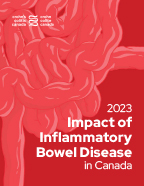Impact of IBD in Canada Report
2023 REPORT HIGHLIGHTS NEEDS OF GROWING NUMBERS AND THOSE WITH MORE BARRIERS TO CARE
This is a report from the scientific community to Crohn’s and Colitis Canada, and the information and recommendations help to inform our perspectives and positions.
June 1, 2023 – Today, Crohn’s and Colitis Canada issued the 2023 Impact of Inflammatory Bowel Disease in Canada report – a comprehensive snapshot of the state of care and implications for the future.
Findings that need to be addressed to improve the lives of those impacted with these diseases:
- The number of people in Canada with IBD is increasing rapidly:
- 322,600 people in 2023 (0.8% of the population) to 470,000 in 2035 (1.1% of the population)
- 11,000 people will be diagnosed in 2023 (1 every 48 minutes) and 14,000 in 2035 (1 every 38 minutes)
- The number of new diagnoses is rising most rapidly in children under the age of 6 years old. They and their families face particular challenges as they age.
- Seniors are the most rapidly growing group since people with IBD are living longer due to better therapies, and our population is aging
- Those with low socioeconomic status, who live in rural, remote and Northern communities and Indigenous peoples face additional barriers to care
2018

270,000
Estimated number of people
in Canada living with IBD
0.7% of pop
2023

322,600
Estimated number of people
in Canada living with IBD
0.8% of pop
2035

470,000
Estimated number of people
in Canada living with IBD
1.1% of pop
Read a summary of the key findings
Dr. Eric Benchimol, report co-chair, and Professor of Paediatrics and Clinical Epidemiology at the University of Toronto, Senior Core Scientist at ICES, and Northbridge Chair in IBD at the Hospital for Sick Children in Toronto, says:
“We see there is a significant impact on mental health – psychiatric disorders are 1.5-2 times more common in people with IBD. Youth with IBD have nearly double the risk of psychiatric diagnosis. This underlines the importance of making mental health services available, especially in children, adolescents and young adults.”
Dr. Gilaad Kaplan, a Professor of Medicine, adult, gastroenterologist, epidemiologist at the University of Calgary and report co-chair, says:
“The number of people in Canada living with IBD is growing rapidly. Healthcare needs to evolve to include multidisciplinary care, including access to specialist physicians and nurses, mental health professionals, dietitians and others to improve quality of life.”
This is the fourth comprehensive report, the first was published in 2008. They bring together experts to provide a comprehensive overview of the impact of IBD in Canada.
Lori Radke, CEO, Crohn’s and Colitis Canada, said:
“The report highlights the need to use our financial and health care resources as effectively as possible. That’s why, since 2016, our PACE network project has brought together leading Canadian hospital centres to develop best practices to help patients. We’re hoping that within the next two years, we start seeing these pilot innovations being rolled out across Canada and leading to better care.”
An innovation for this report was involving patient reviewers. One of them was Léa Caplan of Calgary. She was diagnosed with Crohn’s disease in 2020: “IBD has been an important part of my life for the last three years, so I was happy to be one of the dozens of patient partners. It’s meaningful to know that this report was prepared with individuals living with IBD and is for individuals living with IBD. Our voices are being heard.”
Read the full report below.
Impact Report 2023

Impact Report 2018

Impact Report 2012

Impact Report 2008
